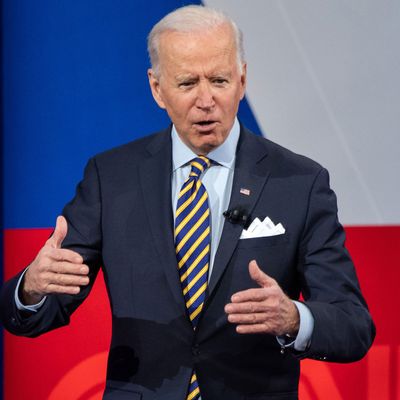
Joe Biden will not make a student-debt jubilee happen. Or so the president promised on Tuesday night.
During a CNN town-hall event, a community-theater director from Racine, Wisconsin, told Biden, “We need student-loan forgiveness beyond the potential $10,000 your administration has proposed. We need at least a $50,000 minimum. What will you do to make that happen?”
Biden replied that he had no intention of facilitating forgiveness at that level. For weeks now, Senator Elizabeth Warren and Senate Majority Leader Chuck Schumer have been publicly calling on the president to forgive $50,000 in student debt per borrower through executive action. But the president has long insisted he is neither able nor willing to do so. Although progressive wonks have argued that it is within Biden’s authority under existing law to forgive the 92 percent of student debt that’s on Uncle Sam’s books, the president has disputed that theory. And even if it were unambiguously in his power to provide such expansive relief, he opposes the policy on principle.
Biden said Tuesday night that he is unwilling to defend forgiving billions of dollars of debt “for people who have gone to Harvard and Yale and Penn,” when that money could be invested in early childhood education for disadvantaged kids. It is not obvious why debt forgiveness would preclude such investments in pre-kindergarten. As a political matter, Joe Manchin’s appetite for deficit spending may be a finite resource. But if Biden were willing to enact forgiveness through executive action, it’s unlikely that this would erode the fiscal space available for spending on other public goods without triggering inflation. After all, according to the fiscally conservative Committee For a Responsible Federal Budget (CFRB), student debt cancellation would barely stimulate the economy, as such relief would not be targeted at those “most likely to spend.” For this reason, while forgiving federally owned student debt would cost $1.5 trillion in accounting terms, the CFRB assures us that it would only “boost economic output during the current downturn by between $115 and $360 billion,” which is not the kind of cash infusion that’s likely to spur runaway price increases.
Anyhow, after disavowing a student-debt jubilee, the president reiterated his support for making community college tuition-free, making state universities tuition-free for students whose families earn under $125,000 a year, and providing full debt forgiveness to graduates who use their education for public-service activities such as teaching in a school or working in a domestic-violence shelter. Biden also (somewhat clumsily) summarized his plan to make existing income-driven repayment plans more generous, such that any individual earning $25,000 or less would not have to make any student-debt payments or accrue interest on their debt.
Biden’s insistence that he lacks the power to unilaterally forgive student debt is of greater practical significance than his opposition to forgiving $50,000 worth; there aren’t anywhere near 50 votes in the Senate for debt forgiveness on that scale. Among advocates for such massive relief, the hope has long been that a Democratic president might exploit a provision in the Higher Education Act that empowers the Department of Education to “compromise, waive, or release any right, title, claim, lien, or demand, however acquired, including any equity or any right of redemption” to forgive student debt unilaterally.
A recent Vox/Data for Progress poll found that a bare majority of voters would support canceling up to $50,000 of student debt for all borrowers who earn less than $125,000 a year, while two-thirds would support canceling $10,000 in student debt for every year a borrower works in national and community service, up to five years. Forty percent back the forgiveness of all student debt.
These results suggest that forgiving up to $50,000 in student debt per borrower would indeed be controversial. And given that Democrats desperately need to increase their support among voters without college degrees, it’s not hard to see why some in the Biden White House may be averse to providing a large legally contested cash transfer exclusively to Americans with college experience. It seems likely that the politics of this issue would be informed by preference intensity: Presumably, a swing voter who personally gained tens of thousands of dollars courtesy of Biden’s presidential pen would be more likely to vote on the basis of that policy in 2024 than an American who was not financially affected by the policy but dislikes the general idea of it. Meanwhile, consolidating the Democrats’ support among millennial college graduates (by relieving the burdens imposed on them by a broken higher-education system) would likely be of significant long-term value to the party. In other words, the politically optimal amount of student debt for Biden to forgive unilaterally, should Congress decline to take action, might be lower than $50,000 — but is almost certainly higher than $0.
For their part, Schumer and Warren aren’t done advocating for $50,000. In a joint statement on Wednesday, the senators wrote, “The Biden administration has said it is reviewing options for canceling up to $50,000 in student debt by executive action, and we are confident they will agree with the standards Obama and Trump used as well as leading legal experts who have concluded that the administration has broad authority to immediately deliver much-needed relief to millions of Americans.”






























